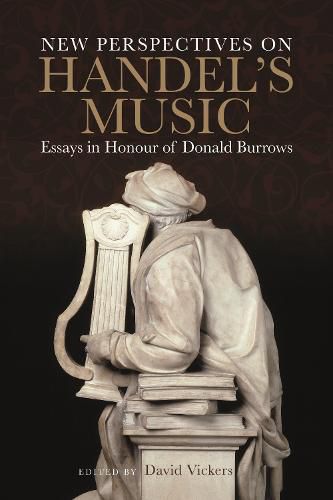Readings Newsletter
Become a Readings Member to make your shopping experience even easier.
Sign in or sign up for free!
You’re not far away from qualifying for FREE standard shipping within Australia
You’ve qualified for FREE standard shipping within Australia
The cart is loading…






As soon as Handel composed, rehearsed and performed his music, it was already a subject of fascination for the authors of reports, polemics and critical appraisals. The continuous yet evolving culture of Handelian studies is represented here in its current state by several generations of scholars who are inspired by the research, publications and teaching of Donald Burrows.
This festschrift contains twenty essays that exemplify aspects both of traditional philological enquiry and of modern interdisciplinary musicology. Much like a baroque dramma per musica, the narrative is divided into three parts. Act I, ‘Handel’s Music and Creative Practices’, is an exposition that sets the scene and introduces the main characters: musical case studies stretch from his first opera Almira (Hamburg, 1705) to his last English oratorio The Triumph of Time and Truth (London, 1757). Act II, is ‘Sources, Documents and Attributions’, develops complications to the plot: there is new information about the authenticity of chamber cantatas and instrumental pieces, and reports on manuscript, printed, and archival sources that demonstrate how primary research may be interpreted and understood. Act III, ‘Context and Reception’, moves us towards the lieto fine: some broad contexts of Handel in relation to his contemporaries and colleagues are considered alongside reception studies of the composer’s music both within and after his lifetime.
DAVID VICKERS teaches Academic Studies at Royal Northern College of Music (Manchester) and is a council member of The Handel Institute.
CONTIBUTORS: Graydon Beeks, Michael Burden, John Butt, Hans Dieter Clausen, Matthew Gardner, Anthony Hicks, David Hunter, H. Diack Johnstone, Andrew V. Jones, David Kimbell, Richard G. King, Annette Landgraf, Triona O'Hanlon, Suzana Ograjensek, Leslie M. M. Robarts, John H. Roberts, Ruth Smith, Colin Timms, David Vickers and Silas Wollston.
$9.00 standard shipping within Australia
FREE standard shipping within Australia for orders over $100.00
Express & International shipping calculated at checkout
As soon as Handel composed, rehearsed and performed his music, it was already a subject of fascination for the authors of reports, polemics and critical appraisals. The continuous yet evolving culture of Handelian studies is represented here in its current state by several generations of scholars who are inspired by the research, publications and teaching of Donald Burrows.
This festschrift contains twenty essays that exemplify aspects both of traditional philological enquiry and of modern interdisciplinary musicology. Much like a baroque dramma per musica, the narrative is divided into three parts. Act I, ‘Handel’s Music and Creative Practices’, is an exposition that sets the scene and introduces the main characters: musical case studies stretch from his first opera Almira (Hamburg, 1705) to his last English oratorio The Triumph of Time and Truth (London, 1757). Act II, is ‘Sources, Documents and Attributions’, develops complications to the plot: there is new information about the authenticity of chamber cantatas and instrumental pieces, and reports on manuscript, printed, and archival sources that demonstrate how primary research may be interpreted and understood. Act III, ‘Context and Reception’, moves us towards the lieto fine: some broad contexts of Handel in relation to his contemporaries and colleagues are considered alongside reception studies of the composer’s music both within and after his lifetime.
DAVID VICKERS teaches Academic Studies at Royal Northern College of Music (Manchester) and is a council member of The Handel Institute.
CONTIBUTORS: Graydon Beeks, Michael Burden, John Butt, Hans Dieter Clausen, Matthew Gardner, Anthony Hicks, David Hunter, H. Diack Johnstone, Andrew V. Jones, David Kimbell, Richard G. King, Annette Landgraf, Triona O'Hanlon, Suzana Ograjensek, Leslie M. M. Robarts, John H. Roberts, Ruth Smith, Colin Timms, David Vickers and Silas Wollston.